Meet an Educator is a monthly series by Early Bird, where we feature the work of educators across India who are actively spreading the joy of birds and nature. This month’s featured educator is Pranav Trivedi, a nature educator from Ahmedabad. He has developed specialised nature education programmes in various geo-cultural settings in seven states of India.
Do tell us about yourself, where you are from, and your work
Growing up in a 60-acre, wooded, institutional campus in the city of Ahmedabad, Gujarat; I was fortunate to have the pleasure of unhindered wanderings in the outdoors – climbing trees, searching for bird nests, exploring tree cavities just for the delight of discovery, catching snakes and escaping from home to watch jackal pups at night! This intimate and powerful contact with nature set the tone for taking me to friends, mentors, opportunities and places/institutions that nurtured the interest and facilitated further formal learning in wildlife science and nature education. All these valuable experiences helped me ponder and reflect on human-nature relationship and how it can be strengthened. This was the beginning of my journey into nature education.
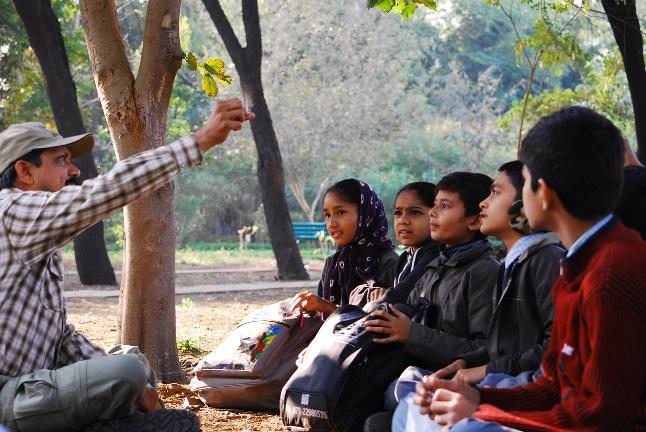
Photo credits: Sangeetha Trivedi
My work involves igniting interest in and developing a bond with nature among people, especially children and youth. I also become an instrument for ‘educators’ (teachers, volunteers, field staff of NGOs and Forest Department) to deepen their connection with nature and enable them to influence others to care for nature. To achieve this, I develop specially-crafted outdoor experiences – nature trails, nature education camps, orientation/training workshops as well as give talks and contribute articles for popular media and books to create awareness about nature conservation. In my 30-year career, I have developed specialised nature education programmes in various geo-cultural settings in seven states of India reaching over 25,000 children, youth and educators.
Are you a birder? What about bird watching excites you?
Well, I began my forays into nature as a ‘birder’, and made regular check-lists, sketches and behavioural observations from my early birding days since 1986. For a long time now, I don’t consider myself a birder as everything in nature appears equally exciting and miraculous to me. From a cell to a whale – all life is nothing less than a miracle and provides valuable opportunity to connect ourselves with our true source – Nature. My bird-watching experiences now-a-days are largely opportunistic and much more rewarding as I connect more deeply with nature without paraphernalia – physical or mental. Also, I rejoice more by watching others derive the joy of appreciating birds and strengthening that interest into conservation.
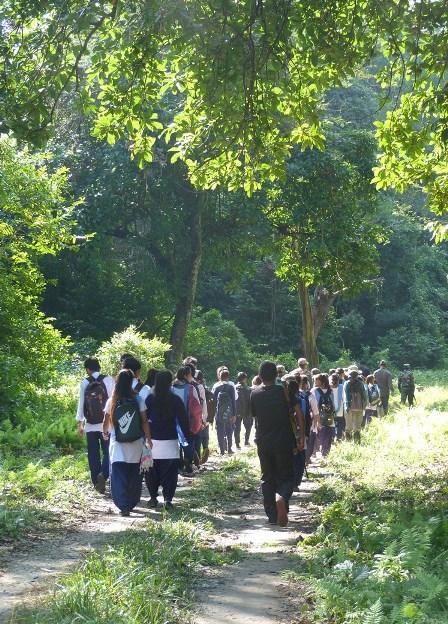
I now regard birds not just as a means to my joy or as agents fulfilling an important function in nature, but consider them ‘ends’ in their own right – fascinating and unique products of evolution worth watching and conserving for their own sake. Bird calls are a special form of immersion in nature; and calls of House Sparrow, Golden Oriole, Common Woodshrike, Rufous Treepie, Ioras, Drongos, Grey-headed Canary Flycatcher, Rosy Starling, Scimitar Babbler etc. are special to me as they touch a chord deep in my being through different experiences/memories. The other facet of birding that I enjoy the most is to find myself in the midst of a mixed-hunting party of birds. I also have my favourites – the drongos, especially the Greater Racket-tailed Drongo displaying its amazing vocal repertoire and unparalleled acrobatics in the mixed-species flocks.
When and how did you get interested in bird/nature education?
From experiencing the challenges, joys and wonders of nature in childhood and youth to volunteering with WWF-India and Sundarvan (a snake park) leading groups for bird-watching field-trips, nature education camps, conducting snake shows; I was naturally drawn to sharing this experience with others. This was probably the precursor to a career in nature education. But, I also wanted to fulfil my dream of “watching and studying wildlife all my life”! So, I went on to get an MSc from the Wildlife Institute of India and was keen to study charismatic carnivores. However, in the last semester of my MSc, I went through a lot of turmoil as to what was more meaningful and important to me – wildlife research or nature education?! Ultimately, nature education won. Thus began my stint with WWF-India as an Education Officer and later with Nature Conservation Foundation and Snow Leopard Trust (USA) as Head of Education Programme.
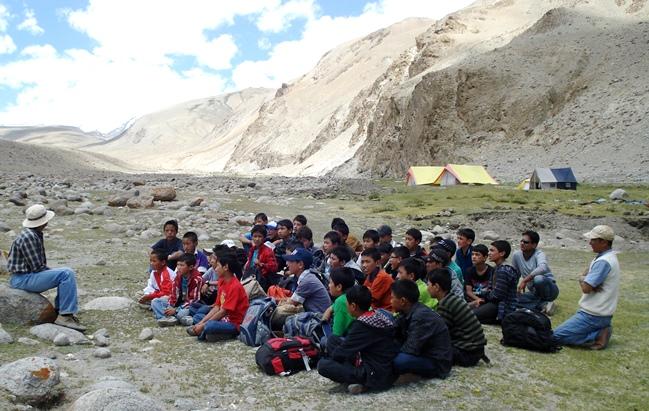
What do you hope to achieve through your education work?
We humans experience fulfilment in two ways – by going inward and meeting the true self or helping/serving ‘others’ and experiencing the reward. Interestingly, for me, nature serves both these purposes. Based on my own experience and that of many others walking this path, I believe that one experiences the richness, uniqueness, vastness and oneness of all life only by immersing oneself in nature. This personal immersion facilitates a deep healing and improvement in one’s relationship with nature; which can foster an attitude of concern and care. To me, this process is of utmost significance in unfolding an individual’s full potential. And for this to happen effectively, one must assume the role of a detached facilitator – that allows nature to take over and transform an individual. We only need to plan and structure the immersion a bit using our skills to develop adventuresome, magical and meaningful experiences. Thus, using the power of nature to reconnect with our true selves and recognising the value of all life through a sense of awe and wonder, compassion and humility is the ultimate goal I strive for – both at a personal or professional level.
Why do you believe it is important for children to learn about birds or connect with nature?
Research shows that out of all the tried and tested approaches/methods, first-hand experiences of nature are one of the most important forms of ‘education’ that create deep and lasting impressions on the human mind, especially so for children. Such a bond or relationship is regarded as a precursor to positive environmental attitudes and action. My own life experiences reiterated this aspect of nature’s power to transform an individual.
Lack of open, natural spaces around homes and schools that used to offer children opportunities for free-play and connecting with the life around has taken a toll on their important childhood experiences in the outdoors. Such natural stimuli are replaced with tools/gadgets and ‘organised sports’, further alienating the child from her roots – nature. Besides, the organic-spontaneous process of passing traditional ecological knowledge from one generation to the other has been disrupted by regular schooling of children and several socio-economic factors. Nature education using the outdoors can bridge this widening gap between humans and nature.
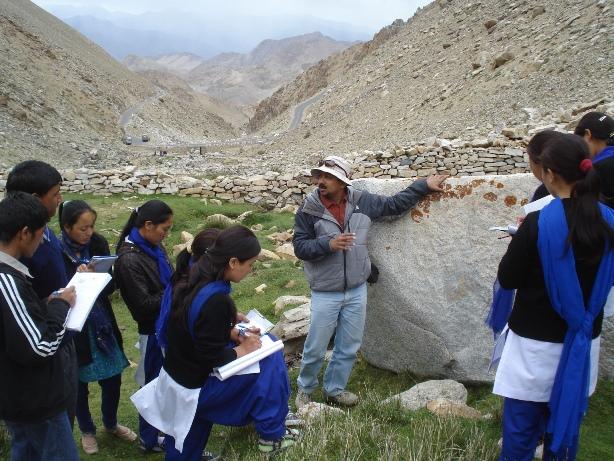
To create a world that has peace, harmony and health, earth needs more people who are both sensible and sensitive to this inherent need of connecting with nature and reap the benefits at physical, psychic and spiritual levels. Well-designed activities and modules promoting experiential learning situations in the lap of nature would really help a child establish an emotional and value-based bond with nature. Such a relationship can ultimately foster the development of what is called an eco-centric attitude (and not ego-centric!) of a sensitive and responsible adult who values nature and her creations for their own sake, not so much in terms of human benefit.
What tools or resources have helped you in teaching about birds? Can you describe an approach that has worked exceptionally well for you?
When I revisit my childhood times spent in nature, I realise that my best resource was an elder friend or a ‘guide’ who was interested in nature and loved being outdoors. We hardly had any tools or resources (except the catapult in early days!). So, the best tool or resource is a good-intentioned and skilled educator who can connect the target audience with nature in a deeper manner.
As for the approach, it was the path that I had walked during my childhood/youth and the one that I was most convinced about – of connecting people with nature through outdoors experiences or specially designed modules – nature education camps, nature trails and orientation/training workshops.
In creating these, I made use of several tools and props (songs, skits, special costumes, melodrama, recorded voice message (human), maps, binoculars, magnifying lenses, illustrations/picture-cards etc) that were essentially tailor-made according to the activity/module vis-à-vis the location. While these are useful in increasing the effectiveness of activities; it is impossible to create better tools/resources than what nature and her elements offer.
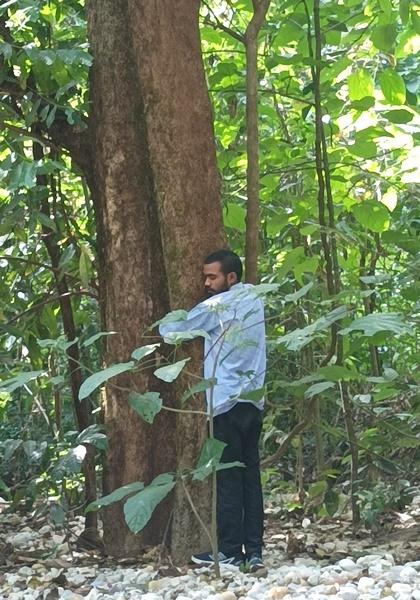
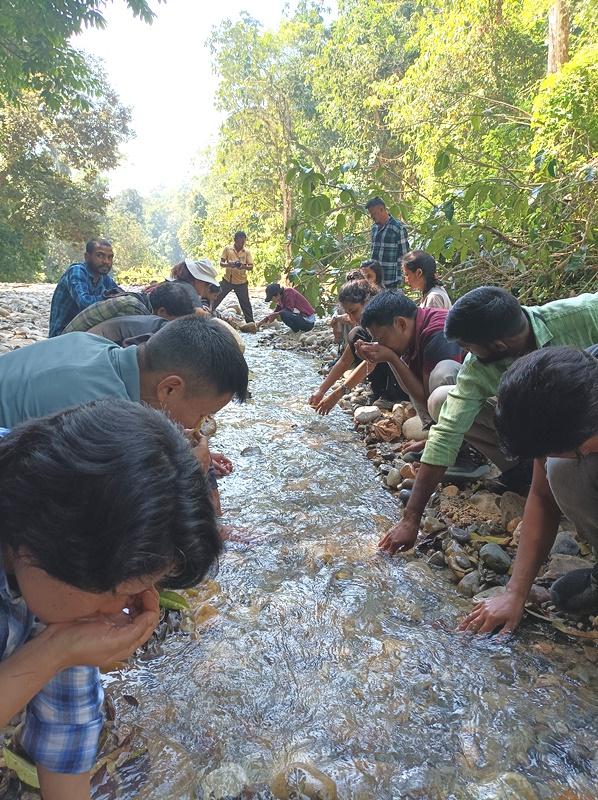
Have you encountered a significant challenge as a bird/nature educator, how did you overcome it?
I remember the period of the early nineties when we took groups of kids and adults for bird-watching or nature camps. Leading the group on a trail, we’ll throw names of many trees, birds and other creatures we encountered, sprinkled with anecdotes and relevant examples for some species; but largely we would just name the species. The participants – obediently following us would write these names, probably catch one or two in their mental filing folders (to be forgotten later) and return to their routine lives. In those days, only leaders or a couple of volunteers would have binoculars, which were too few to enable all participants to view birds satisfactorily.
And yet, somehow everyone was happy with this form of nature education – including myself. But, it was becoming apparent to me that there was something amiss and it wasn’t just about lack of binoculars or equipment. We just weren’t reaching the audiences as effectively as we could. Without much guidance or reading material, I was sort of lost in my own world of doubts and confusion. Thankfully, I was at least clear that a holistic change had to be brought in the way we conceived, designed and conducted these activities. We needed to transcend from ‘showing and telling’ to ‘sharing and doing’, while focusing on specific messages and proper structure (rather than naming and labelling species) that would give a powerful springboard experience to the participant.
I gained clarity on nature education pedagogy through a course and did a lot of reflection and reading. The emerging ideas on changing work methods materialized into a project. The project aimed to target the 20 or so volunteers of WWF-India, Ahmedabad through a series of training workshops on nature education to bring a change in the way we thought about and implemented nature education as a team. Alongside, I developed a long-term nature education programme for school children (6 to 14 years) consisting of a series of thematic, sequential, cumulative, outdoors-based and experiential modules that introduced them to the natural world, with each child attending one module/camp every year – starting from a day long to 4-day experiences.

Before we introduce the camps, orientation and training of the concerned institution’s staff and school teachers takes place through specially designed 3 to 7 day workshops. The springboard experience of camps is linked and followed-up with in and around school activities through the year (in the form of a calendar worked out with school nature club/eco club coordinators). Having followed this model in seven Indian states; improvising upon it and taking it to both private and government school children, teachers and educators in varied geo-cultural settings; I am now confident about taking this approach anywhere and attain success.
Do share any memorable moment or experience you have had in teaching kids about birds/nature. Can you recall any insightful instance that shaped your perspective?
I’ll share two special experiences here:
Gujarat: In one of the camps in Polo forest of north Gujarat, the principal of the school accompanying us asked about the retention power of these camps. I requested the participants to present their learning of the previous year’s camp as a skit. In less than 15 minutes three different groups presented all the important ecological concepts they had learnt! It would have been impossible for me to do this, but the children reinforced my belief, while satisfying the principal’s query.
Spiti Valley: In one of the nature education camps for class 8th students of Munsel-ling school, Spiti Valley; we had a special guest in whose honour I’d created a special module. As part of that, he remained ‘incognito’ observing the proceedings with great interest. We finally disclosed in the last session of the camp that he was none other than Dr George Schaller! Finding a scientist and conservationist of such repute amongst them, the kids got so excited and moved that they prayed for his safe and long life wishing him success in his wildlife conservation endeavours. It was so touching when on our request they wrote special letters to him, which we shared with Dr Schaller later. Here’s what he had to say…
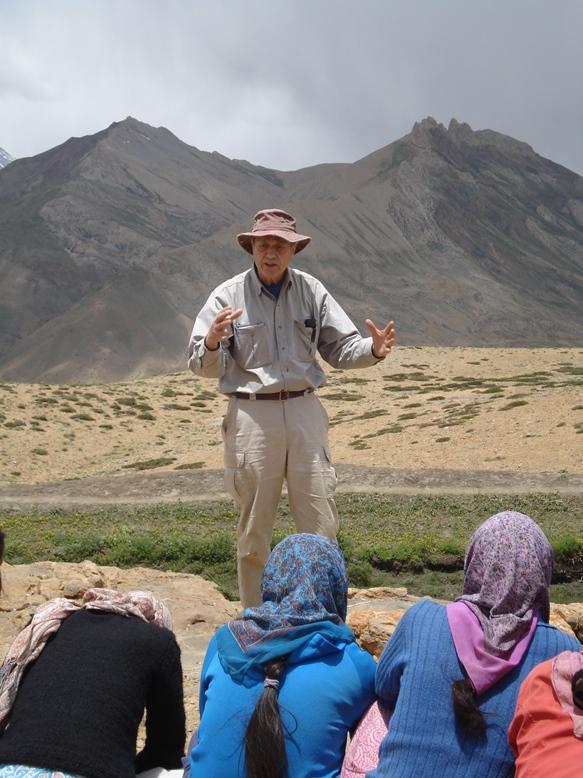
“I read the essays by the students with great pleasure. The essays are also very well written not only the English but also with insight. You obviously are having a great impact on them. I am sure that they will carry the few days with you in the field far into the future and that they will listen to, smell, and look at nature in a different way and be concerned about protecting all beings. My congratulations on your exceptional influence. The students obviously enjoy your course tremendously and it will remain with them as a happy memory.”
– George Schaller
Have you noticed any changes in your learners after they received exposure to birds and nature-based learning? If yes, what are they? If not, why do you think that is?
Our observations coupled with various modes of feedback we plan and receive, indicates that many children and adults who attend the modules enjoy the experience, get interested in nature; and show change in the ethical, affective and cognitive domains. Those who have attended more than two modules seem to show higher retention of learning with some even showing changes in behaviour emphasizing the need for deeper-prolonged exposure to nature.
About 25 participants who attended our nature education camps in Spiti during different years have volunteered in one way or the other at the camp-site each year since 2012 or so. Similarly, NCF staff of Ladakh who got trained to conduct the camps, regularly volunteer for camps even after they have quit their NCF job.
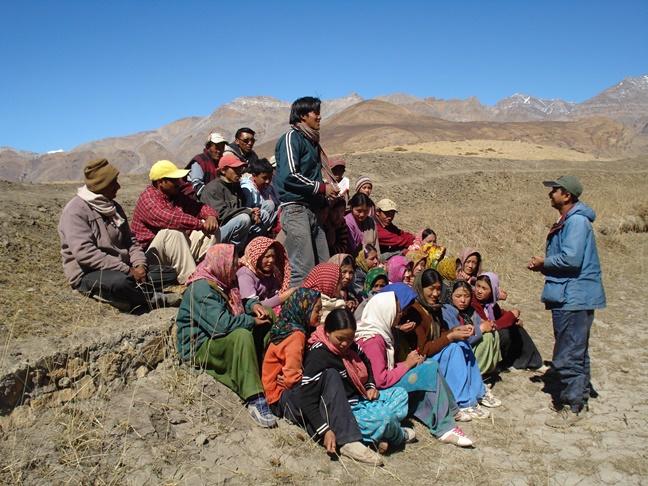
Photo credits: NCF-SLT Field Staff
Rinchen Tobge – a camp participant in Spiti in the year 2007 shared on the last day of camp that he is fond of bharal (blue sheep) and wants to get involved in its protection. Since 2015, he is a staff member of NCF involved in doing exactly what he dreamt of! The impact has come full circle in other instances too, where some of the earlier camp participants/volunteers have sent their children to attend my nature education camps.
I am still connected with most of the volunteers who were active from 1995 to 2005 during the initial phase of my work. I bump into many camp participants who attended camps during late 1990s to 2010, now settled into their own profession/work; most of them have shared vivid memories of the camp experience and even relate to the learning in their day-to-day lives.
What message would you have for your fellow educators, or somebody starting out in their nature education journey?
Nature is our true Source and NOT a Re-source! This distinction is important to have a holistic attitude entailing awe, gratitude, reverence and wonder towards nature. In this light, each nature educator is playing the vital role of connecting people to their true source that could ensure a healthy and harmonious relationship with mother earth. To do this effectively, we need to create a ‘curriculum’ of nature education for everyone, instead of making nature education a part of the school curriculum!
Developing complete, thematic, structured and outdoor-based experiential programmes (think at least 10 years) will ensure continuous and long-term engagement. Creating exciting learning adventures is the key to hook and pull the learners and not push them. Immersion in nature is our primary goal, which means children/participants must engage with nature in a direct and multi-sensory manner to have first-hand experience.
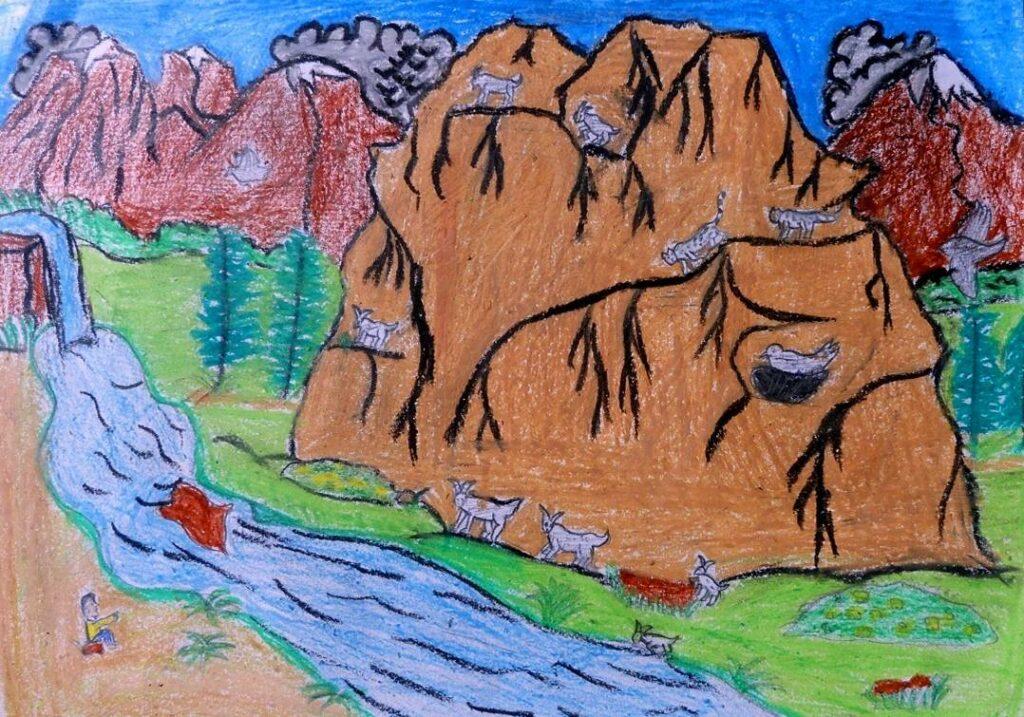
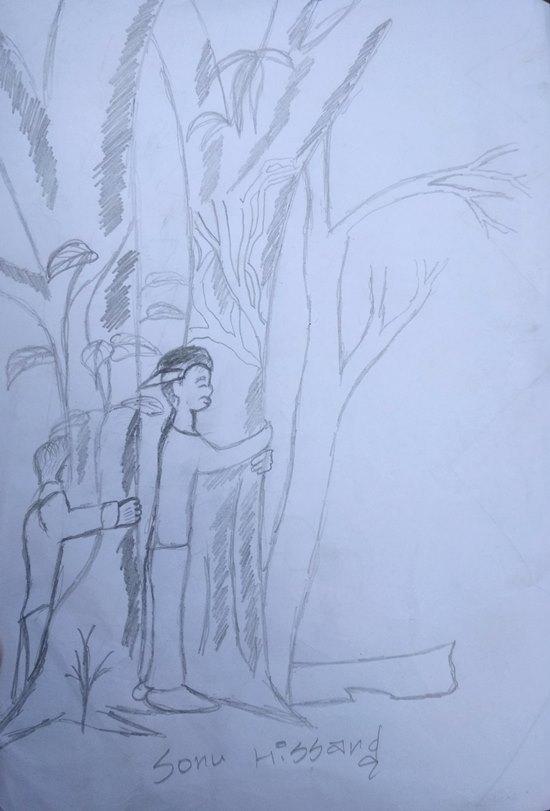
And, if you really wish to dissolve the barriers created by imaginary fears and pretense; you need to immerse people deeply in nature by engaging them for longer durations; that too repeatedly and frequently. Nature education thus becomes a continuous and sustained process of nurturing the human body-mind-spirit. And while you do all of this, you too must enjoy the process! After all, the participants aren’t here to just ‘learn’ from you, rather they get enthused and inspired by what you are, isn’t it?

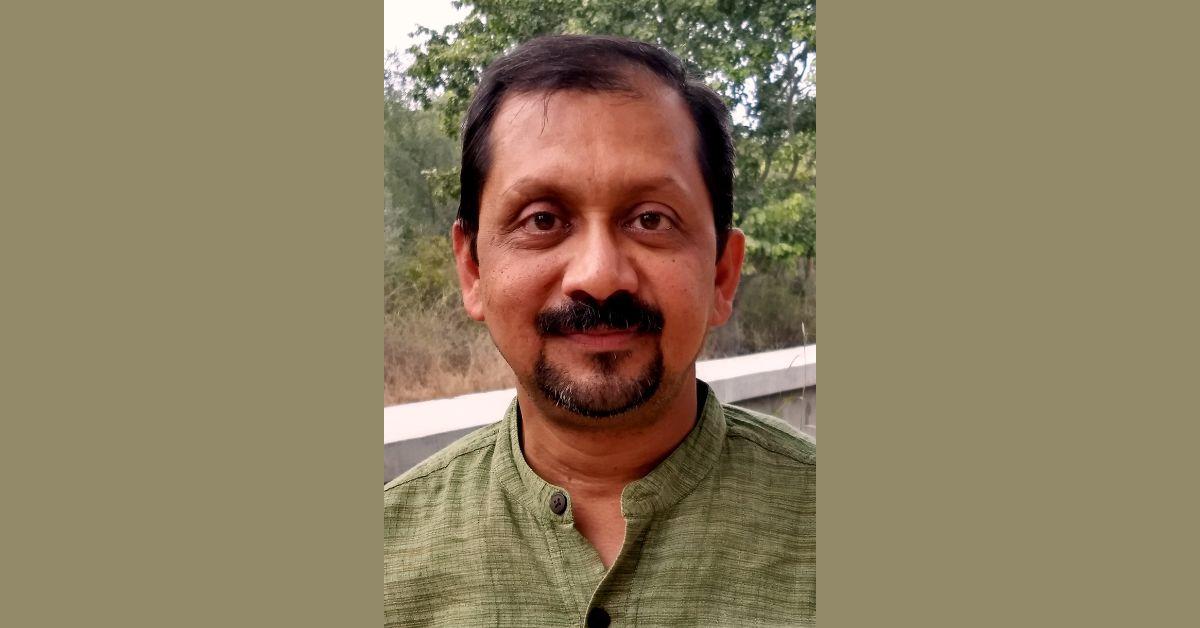
Very nice work . The Article gives insight on love and conservation of our natural wealth. Indeed, nature is the source and not resource.Education of nature to young ones and youth will certainly make the difference to future incredible Bharat 🇮🇳
बहुत ही सराहनीय कार्य सर,
Dr. Pranav Trivedi is a good friend of mine, I have seen him as a wonderful naturalist since 1990. He is a very good scientist along with a superb nature educator.
Namaste,
Superb work. Give Education of Nature to young Bharat.
Love.
Namaste,
Nice One
Great work! Wonderful! So proud of you!
A wonderful and absolutely necessary step forever with a new generation towards
the nature.
I have known Pranav for some time now and have also been aware of his passion for environmental education. Reading through this insightful piece of prose, I realised for the first time,how little I know the one person with whom I inter-acted so very frequently. The ‘ chai pe charchas ‘ were an intrinsic feature of our brainstorming but we missed the woods for the trees,all of it wholly my fault. I have lots to make amends and much,much more to discuss with him now.
Congratulations Pranav !! Great work. Proud of you.